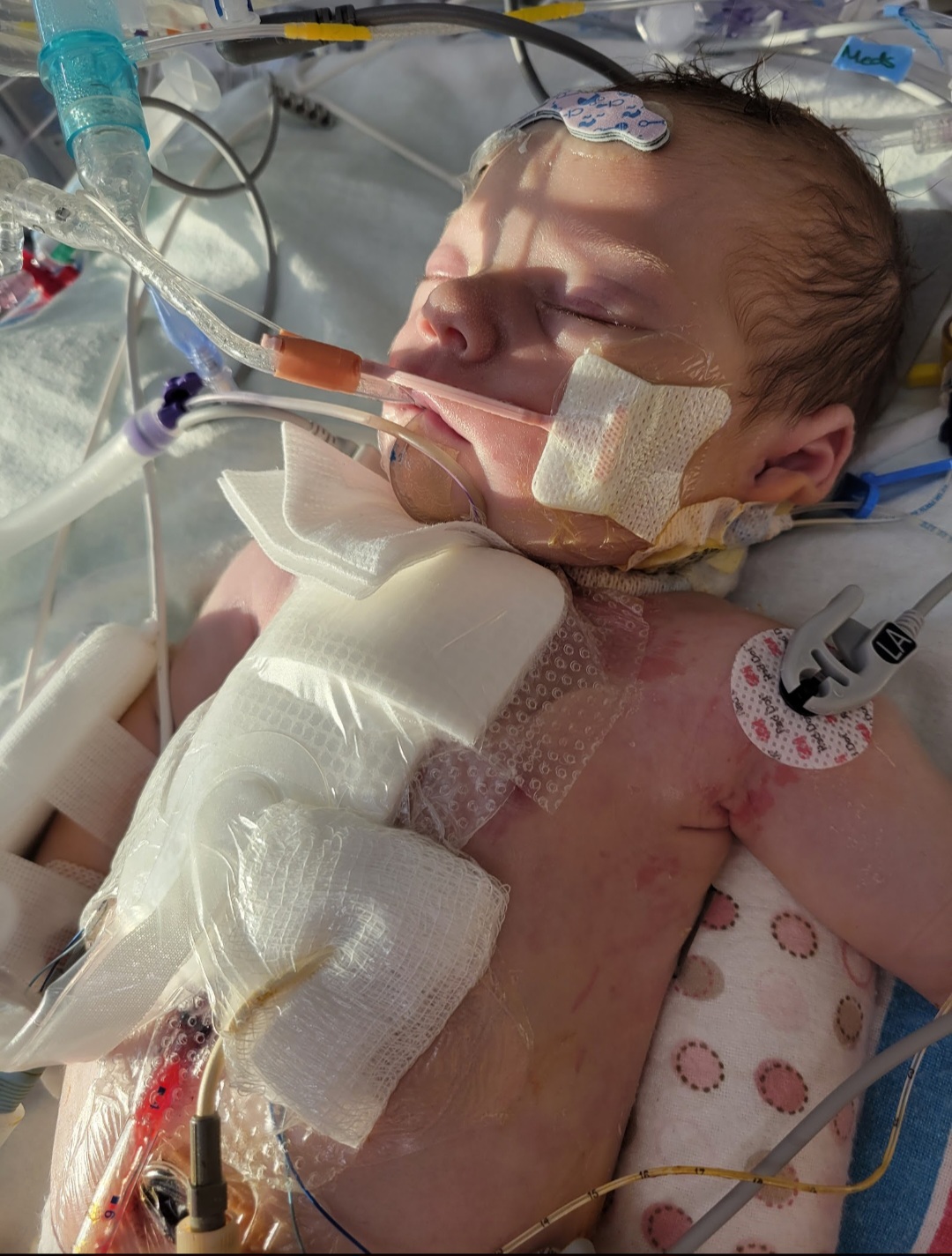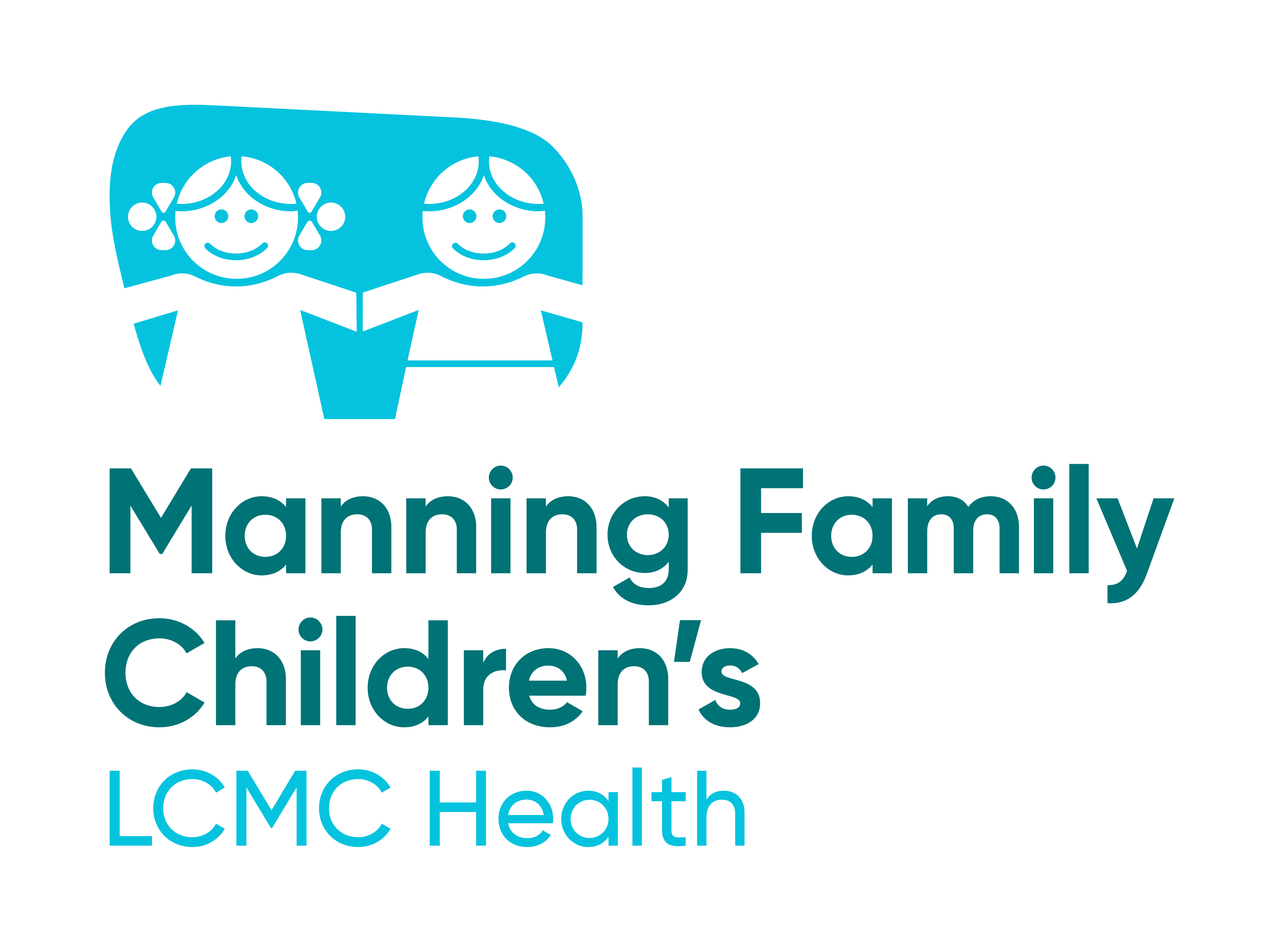Kinsley’s Heart Story: How Manning Family Children’s At-Home Monitoring Program (HIPPOS) and Expert Care Made a Difference
- Category: Cardiology, Patient Stories
- Posted on:

Shelby and Eddie Betzer are parents to three beautiful daughters. After the heartbreak of a miscarriage, they were happy to discover they were expecting again. However, their joy turned to concern during a routine 20-week ultrasound, when doctors discovered their baby, Kinsley, had a serious heart condition.
Up until the 20-week mark, Shelby’s pregnancy had been smooth and uneventful. However, everything changed when an ultrasound revealed a potential issue with Kinsley’s heart. Shelby began frequent visits to her OB-GYN and a Maternal-Fetal Medicine specialist at East Jefferson General Hospital in Metairie. She was soon referred to Shannon Powell, DO, a cardiologist at Manning Family Children's, who closely monitored Kinsley’s heart development throughout the remainder of the pregnancy.
A Complex Diagnosis
Throughout Shelby’s high-risk pregnancy, her care team kept a close watch on Kinsley’s heart condition. There was concern for heterotaxy syndrome with a variant of a single ventricle which was confirmed after birth.
Born at 39 weeks via C-section at East Jefferson General Hospital, Kinsley was immediately transported to the Cardiac Intensive Care Unit (CICU) at Manning Family Children's. Doctors soon confirmed that she had Right Atrial Isomerism (Heterotaxy), a rare condition that causes abnormal positioning or formation of the heart and other organs. This led to several severe heart defects, including:
Atrial Situs Inversus: The upper heart chambers were reversed.
Unbalanced Atrioventricular (AV) Canal: Blood flow was unevenly distributed between the heart’s ventricles.
Dextro-Transposition of the Great Arteries (d-TGA): The two main arteries leaving the heart were switched, causing oxygen-poor blood to circulate through her body.
Pulmonary Atresia: Her pulmonary valve was completely blocked, preventing blood from reaching her lungs.
Single Coronary Artery: Kinsley’s heart had only one coronary artery instead of two.
Despite these challenges, Shelby held onto hope. “I knew it was serious, but I trusted the team at Children’s to give Kinsley the best care possible,” she recalls.
 Nine Weeks in the CICU
Nine Weeks in the CICU
Kinsley underwent several delicate heart procedures at Manning Family Children’s. She was just seven days old when she underwent her first procedure to redirect blood flow, ensuring oxygen could reach her body.
During her nine weeks in the CICU, Kinsley had a central shunt placement and subsequently a right pulmonary artery stent to improve her oxygen levels.
“Her oxygen was dangerously low, around 70 to 75. They worked so hard to stabilize her,” Shelby shares.
The nurses and doctors provided not only exceptional medical care but also emotional support. They went above and beyond to make sure Shelby and her family were comfortable.
Navigating the Interstage Period: The Home Monitoring Program
When Kinsley was discharged after her first heart surgery, her family entered a critical phase of her care called the "interstage period," the time between the first and second surgeries. To ensure Kinsley’s safety and health during this time, she was enrolled in the hospital’s High-Risk Interstage Pediatric Provider Observation Squad (HIPPOS) Program with a team comprised of Dr. Powell, Stephanie Bush, NP, and Lynn Bardales, RN. The HIPPOS Program is a specialized home-monitoring initiative designed to empower families with the tools and guidance needed to track their baby’s progress while at home.
“The interstage period for single ventricle patients is the riskiest time in their lives, with the highest chance of complications or even death,” said Dr. Powell. “This vulnerable stage requires close monitoring to prevent serious complications, support optimal growth, and ultimately improve survival rates and quality of life. Through our HIPPOS program, we closely monitor these patients to significantly reduce these risks. Our goal is to minimize hospital readmissions and improve outcomes during this critical phase, ensuring the best possible quality of life for our patients.”
As part of the program, Shelby used a specialized Cardiac High Acuity Monitoring Program (CHAMP) app to track Kinsley’s vitals, such as oxygen levels, weight, and feeding progress. The app made it easy for Shelby to log this information daily and share it with Kinsley’s care team. The data from the app could be reviewed by her doctors in real time, allowing them to monitor Kinsley’s condition closely and respond immediately if anything concerning came up.
“The HIPPOS program was a lifeline,” Shelby shares. “It gave us peace of mind knowing that her care team was always just a phone call away.”
As part of the program, Kinsley’s medical team provided Shelby with training and resources to confidently manage her daughter’s care. This included a pulse oximeter for measuring oxygen levels, a scale for daily weigh-ins, and detailed instructions on what to monitor and when to call for help.
The HIPPOS Program wasn’t just about equipment—it was about connection. Regular check-ins with the care team at Manning Family Children’s ensured that any concerns were addressed promptly, and Shelby knew she had a dedicated support system during this challenging time.
By catching potential issues early and maintaining close communication with Kinsley’s care team, the HIPPOS Program played a vital role in keeping her stable and preparing her for the next step in her surgical journey.
At four months old, Kinsley underwent her second surgery, the Glenn procedure, to further improve blood flow to her lungs. This surgery was a critical step in her journey, and it allowed her heart and body to continue developing in preparation for future procedures.
.jpg) Kinsley Today
Kinsley Today
Today, at two years old, Kinsley is thriving. Her oxygen levels have stabilized, and she’s full of energy.
“She’s such a happy, curious little girl,” Shelby says. “Always smiling, always on the go, and never shy about showing her personality.”
As part of her regular follow-ups, Kinsley sees Dr. Powell, her pediatric cardiologist at Children’s, who carefully monitors her heart health, making adjustments as needed. Kinsley also takes medications to support her heart function, control her blood pressure, and prevent complications as she grows.
At approximately 4 years of age, Kinsley will undergo her third surgery, the Fontan procedure. The Fontan is a critical surgery for children with single ventricle heart defects like Kinsley’s. It helps re-route the blood flow so that it bypasses the heart and goes directly to the lungs, allowing the lungs to receive oxygenated blood more efficiently. This procedure is often the final step in a series of surgeries for children with this condition, helping to improve heart function and quality of life as they grow.
Shelby and Eddie remain hopeful as they look to the future, knowing their little girl is a heart warrior.
“She’s a fighter,” Shelby says. “She’s been through so much, but she’s always smiling. Every milestone she reaches feels like a miracle, and we’re so proud of her. She has persevered through everything. We’re incredibly grateful to the team at Manning Family Children’s for everything they’ve done for her.”
For more information about the Heart Center at Manning Family Children’s visit https://www.manningchildrens.org/services/heart-center/
For more information on the High-Risk Interstage Pediatric Provider Observation Squad (HIPPOS) Program at Children’s, visit Home Monitoring Program | Cardiac High Acuity Monitoring Program New Orleans



